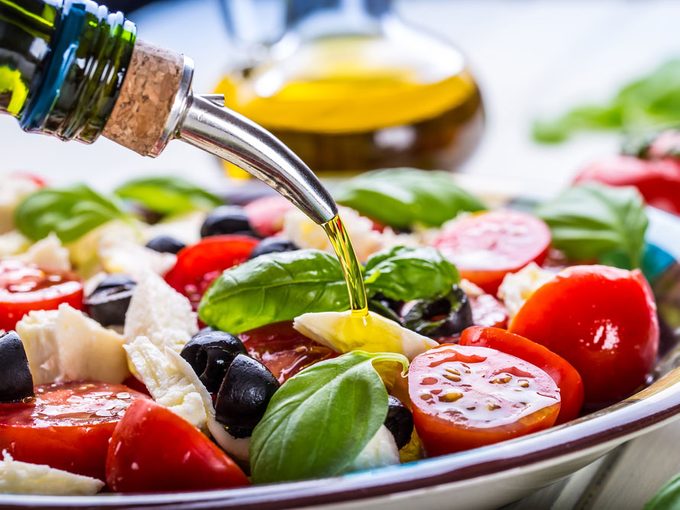How Olive Oil Benefits Your Health
You’re likely already using olive oil on your salads and in your cooking – but did you know that it also has health benefits that could lead to a longer life?

Source: The Amazing Healing Powers of Nature, Reader’s Digest
It’s time to tap into the health benefits of olive oil
Olive (Olea europaea) may be the secret to a longer life. Today, the amazing benefits of oil pressed from olives are known far and wide. But prior to 1958, this tasty ‘good fat’ was a secret little known beyond Mediterranean kitchen tables.
Olive oil helps in the prevention of heart disease, stroke and dementia, as well as cancers of the breast, respiratory tract and upper digestive tract. Research shows it may have the potential to lower the risk for osteoporosis and diabetes, too.
Olive oil is a good fat
There is evidence that diets rich in saturated fats such as fatty meat and butter boost ‘bad’ LDL cholesterol and heart-disease risk. But, a diet packed with olive oil, fruit and vegetables protects the heart and arteries’making olive oil an important (and easy to access) component in protecting your heart and nutritional health. (Research points to the Mediterranean diet as one of the healthiest diets to follow.)
How it works
Olive oil is uncommonly rich in a monounsaturated fat called oleic acid and in compounds called polyphenols, a combination that has unique abilities to cool off inflammation, keep artery walls flexible so that blood pressure stays lower, reduce cholesterol, switch on genes that guard against heart disease and a prediabetic condition called metabolic syndrome and protect cells from damage.
How to get the health benefits of olive oil
Try to aim for 1 to 2 tablespoons (15 to 30 millilitres) of olive oil a day.
Use extra virgin olive oil, as it has higher levels of health-promoting, inflammation-soothing compounds called polyphenols.
Drizzle on vegetables or salad or use it as a bread dip. But think twice about cooking with it: heat destroys between 5 and 30 percent of the polyphenols, according to the American Institute for Cancer Research.
Modern research and studies on the health benefits of olive oil
A headline-making 2012 study by the Catalan Institute of Oncology in Barcelona that tracked 40,622 people for 13.4 years found that those who used 2 tablespoons (30 millilitres) of olive oil a day were 44 percent less likely to die from heart disease.
Enjoying one tablespoon a day in food reduced risk 28 percent. A major review of studies on olive oil and cancer by Milan’s Mario Negri Institute for Pharmacological Research concluded that using the oil regularly could reduce breast cancer risk by 38 percent and could protect against cancers of the respiratory and upper digestive tract and colorectal cancer.
A healthy diet that includes olive oil matters for your mind, too. In a dramatic 2011 study at the University of California Davis, magnetic resonance imaging brain scans of 770 people over 65 years of age found that those who followed an olive oil-rich Mediterranean diet were 36 percent less likely to have signs of brain damage from silent strokes, lowering their risk for dementia.
In a 2009 study of 215 people with type 2 diabetes, researchers from the Second University of Naples, in southern Italy, found that 56 percent of those following a healthy diet with olive oil controlled their diabetes without drugs, compared to just 30 percent who stuck to a low-fat diet. The reason? Compounds in olive oil help the body process blood glucose in a healthier way.
Other good news about olive oil concerns bone health. A 2012 study of 127 men conducted at Hospital Dr Josep Trueta in Spain found that a healthy diet incorporating olive oil even seems to help preserve bone mass’which could protect against fractures.
Inspired to add more olive oil to your diet? Try these healthy recipe ideas.




